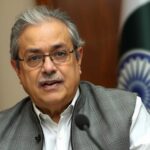Pakistan Strengthens Ties with Bangladesh Following Political Shift Post-Hasina
Following Sheikh Hasina’s ouster, Pakistan and Bangladesh have strengthened their ties amid mutual anti-India sentiments. Key military meetings and diplomatic exchanges suggest a potential shift in the geopolitical landscape of South Asia. However, historical tensions and economic dependencies make the situation complex, requiring careful consideration of future policies.
Pakistan and Bangladesh’s relationship has shifted closer since the ousting of Sheikh Hasina, as both countries share a prevailing anti-India sentiment. With an intensifying focus on military cooperation, Pakistani army chief General Asim Munir met with Bangladesh’s Lieutenant General SM Kamrul Hassan, highlighting their commitment to mutual support despite historical tensions. Recent diplomatic exchanges, including meetings between leaders and Pakistan’s foreign minister’s upcoming visit, suggest the geopolitical landscape of South Asia may be undergoing a significant change.
The historical discord between Pakistan and Bangladesh stemmed from a brutal liberation war in 1971 that resulted in Bangladesh’s independence following mass violence perpetrated by Pakistani forces. While Pakistan recognized Bangladesh in 1974, unresolved issues linger, including Pakistan’s lack of an official apology for past atrocities. During recent meetings, Bangladesh’s interim government urged Pakistan to settle these longstanding grievances.
Experts suggest that strained India-Bangladesh relations, together with the new government’s pursuit of military and economic support, are encouraging warmer ties between the two nations. Unresolved human rights concerns regarding Hasina’s administration continue to impact India-Bangladesh relations, but Bangladesh appears to be reassessing its geopolitical alliances in light of a tumultuous political landscape.
Despite budding relations between Pakistan and Bangladesh, experts caution against interpreting these developments as a definitive shift in geopolitical allegiance. Bangladesh’s geographical realities and ongoing economic connections with India are likely to maintain a degree of balance in its foreign policy. Both nations still face historical tensions and distinct interests that temper the potential for a full alignment.
The evolving geopolitical situation is further complicated by India’s increasing involvement with Afghanistan’s Taliban rulers, leading to unease in Pakistani circles. Islamabad’s waning influence over the Taliban, amid rising internal security challenges, may prompt Pakistan to seek alliances that bolster its regional standing. The potential for enhanced military cooperation with Bangladesh during this transitional phase may signal new alignments in South Asia.
Economically, Bangladesh’s growth, projected at 6 percent, contrasts sharply with Pakistan’s 2.5 percent expansion, encouraging Islamabad to look for partnerships that can stimulate economic relations. Trade dynamics, which currently favor Pakistan in exports but reflect minimal imports from Bangladesh, may undergo transformation. Enhanced diplomatic engagements and adjusted visa processes could foster greater economic collaboration between these neighboring countries.
The focus of this article elucidates the recent warming of relations between Pakistan and Bangladesh following Sheikh Hasina’s political ouster. This shift appears rooted in shared regional concerns, primarily involving India. Insight into the historical animosities stemming from Bangladesh’s independence struggle indicates that ongoing political dynamics may alter long-held tensions and foster new collaborations. The evolving geopolitical landscape of South Asia, including Bangladesh’s economic performance and India’s relations with the Taliban, serves as a backdrop for this development.
In summary, the evolution of Pakistan-Bangladesh relations may signify a response to changing political landscapes and a shared desire to counterbalance India’s influence. While the historical context and unresolved issues remain significant, recent diplomatic engagements could herald a new chapter for cooperation. Analysts remain cautious, emphasizing the complexities inherent in reshaping long-standing geopolitical dynamics and the necessity for substantial policy adaptations to re-evaluate regional alignments.
Original Source: www.aljazeera.com








Post Comment